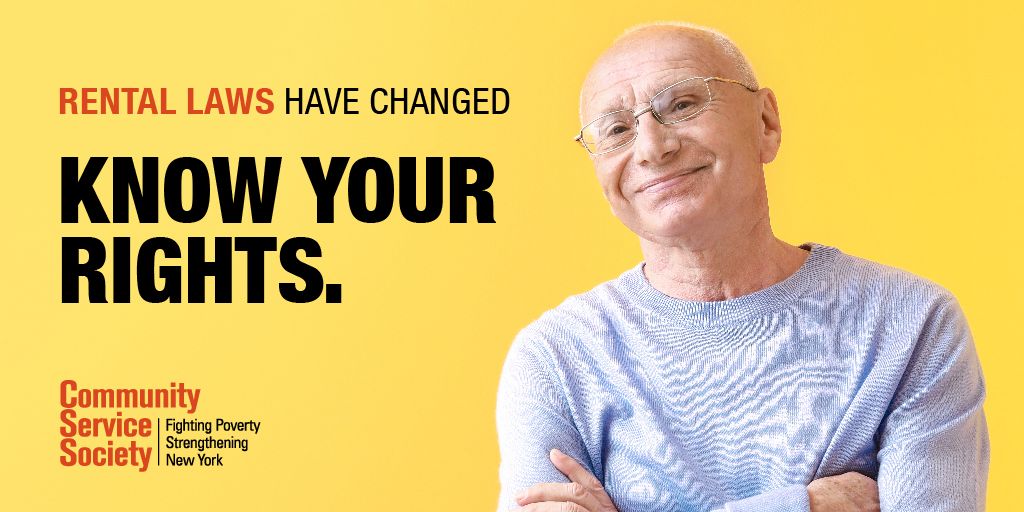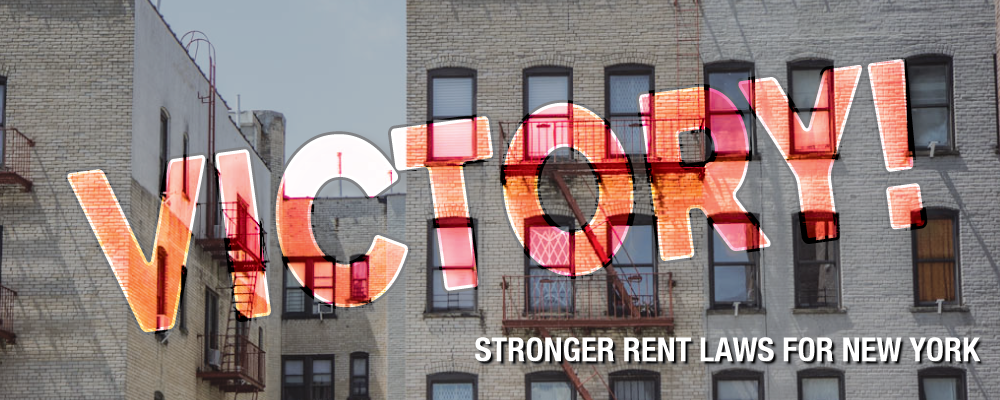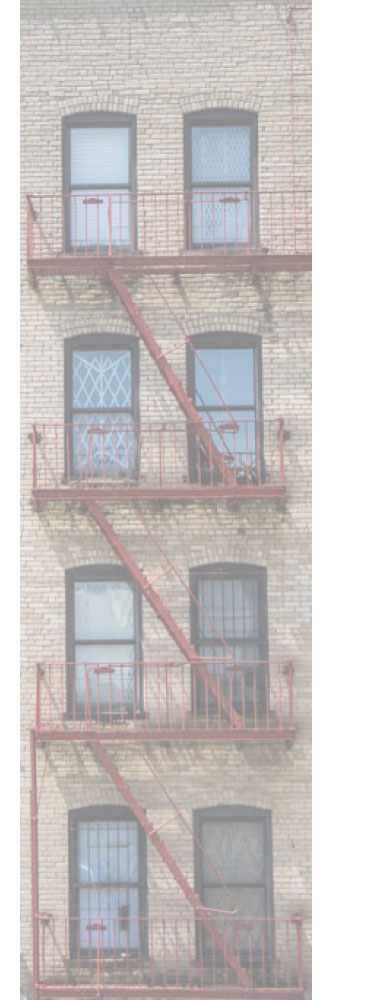
Learn About NY’s Rent Laws
Closed loopholes and expanded protections for tenants
We did it! Read our statement on the new, stronger rent laws passed by New York State
--------------------
The laws protecting over a million renter households in New York City and Westchester, Nassau, and Rockland counties are at stake when they come up for renewal June 15th, 2019.
What happens will determine whether rents will remain affordable for New Yorkers—especially for those struggling most economically:
365,000 low-income households live in rent regulated apartments in New York City—twice the number who live in public and subsidized housing combined.
That’s why Community Service Society has joined forces with 60+ other groups in the Housing Justice for All Campaign to advocate for a 9-bill platform to roll back loopholes and expand protections to more tenants statewide.
Our latest research explains why the current rent regulation system is broken and how to fix it, reveals how loopholes in the law can lead to huge jumps in rents and tenant harassment, and demonstrates the crucial importance of housing issues in urban areas of New York State beyond New York City.
Click below to read testimonies from CSS experts on the importantance of strenghtening and expanding our rent laws.
Testimony: Why New York Needs Universal Rent Control (5/9/19)
Testimony: Proposed Changes to Rent Stabilization (5/2/19)
Testimony: NYC Rent Guidelines Board Hearing (4/25/19)
Read our latest research to learn more about New York's rent laws and how to fix them.
Download publication here
Download publication here
Download publication here
Download publication here
These fact sheets were prepared by the Upstate Downstate Housing Alliance.
Your Rights as a Tenant in New York State:
Today, New York State’s tenants and manufactured home residents have stronger rights than we have had in a generation, hard won after a decades long struggle. The fight isn’t over: the new law is only as strong as our ability to organize to protect and enforce it. It’s up to us, as community members, to both know our rights and to talk to our neighbors about them. If you are interested in learning more, or you want to organize in your community, email .(JavaScript must be enabled to view this email address), or visit www.housingjusticeforall.org.
All tenants in New York State are protected by the basic set of rights, some of which are described below. As a tenant, you are covered by these rights, regardless of what is written in your lease or even if you don’t have a lease. Your landlord cannot take these rights away from you.
Note: If you live in a rent stabilized or rent controlled apartment, or in a manufactured home community, you may have additional protections. If you live in subsidized/affordable housing, pay your rent with a voucher, or live in public housing you may have different rights that are set by the federal government.
- You have the right to live in a safe and well maintained apartment. Your landlord has to comply with a legal “warranty of habitability” standard, providing you with basic services and keeping the apartment and building in good repair.
- You have the right to organize. Your landlord is not permitted to retaliate against you for seeking to improve your living conditions or for organizing your building. If you complain to your landlord, managing agent, or to government officials about your living conditions and your landlord asks you to leave, refuses to renew your lease, or raises your rent by more than 5%, this could be considered unlawful retaliation by a judge and the court may require your landlord to offer you a renewal lease.
- You have the right to fair warning if your landlord intends not to renew your lease or substantially increase your rent. Your landlord must give you at least 30 days notice if they are not planning to renew your lease or will raise your rent by more than 5%. If you have been living in your home for over a year, your landlord must give at least 60 days notice. If you have been living in your home for more than 2 years, your landlord must give at least 90 days notice.
- You have protections against expensive security deposits and application fees. Your landlord cannot charge you more than one month’s rent as a security deposit. When you move out, they must return the security deposit within 14 days. If a landlord keeps any of the security deposit, they must give you a written itemized list of what they are charging you for. Landlords cannot charge application fees. Background and credit check fees are capped at $20.
- You have protections against expensive late fees. Your landlord can only ask for a late fee after 5 days have passed from the date the rent was due. The late fee must be specified in your lease.The late fee can not be more than 5% or $50, whichever is less.
- You have protections against the tenant blacklist. A landlord cannot deny you an apartment based on a previous landlord/tenant dispute.
- You have protections if you need to break your lease. If you have to move before your lease is up, your landlord has to make a good faith attempt to re-rent the apartment. If the landlord wants you to pay the rent for the full lease term, they must prove in court that they made a serious effort to re-rent the apartment, and were unable to find a new tenant.
- You have protections against illegal evictions. Your landlord cannot force you out of your home, remove your possessions, remove the doors, change the locks, or otherwise prevent you from accessing your apartment. Landlords do not have the legal right to force you to leave your apartment. You may only be evicted by a sheriff or marshal, after a court issues a warrant of eviction.
- You have protections in court. If your landlord brings you to court to try to evict you, you can request to postpone the hearing for at least 14 days to make up the back rent, seek legal help, or more. If you are facing eviction because you owe back rent, you have the right to pay the back rent at any time during the eviction process. The landlord must accept the rent and drop the case. Landlords can only evict you for unpaid rent, not fees or non-rent charges. Some tenants in New York City have access to free housing court attorneys. To find out if you qualify visit www.evictionfreenyc.org.
- If a judge rules that you must move, you may have up to a year to find a new place to live. If a judge rules against you in court, your eviction may be postponed for up to a year to give you time to find a comparably priced home in your neighborhood or if moving immediately will cause you and your family hardship. You must pay your rent during this period of time, and prove that you are looking for a place to live.
Your Rights as a Rent Stabilized Tenant in New York:
All rent stabilized tenants in New York State are protected by the rights described below. There are approximately one million rent stabilized apartments in New York State, generally located in buildings built before 1974, with 6 or more units. Your lease may or may not indicate that your apartment is rent stabilized. To find out if it is, visit www.amirentstabilized.com.
- All communities in New York State can opt-in to rent stabilization. Right now, rent stabilization covers New York City, as well as some communities in Nassau, Rockland, and Westchester counties. In order to bring rent stabilization to your community, local leaders (city, town, village, or county governments) have to opt-into the state law. Visit www.housingjusticeforall.org/etpa to get started on a campaign to bring rent stabilization to your community.
- You have the right to a renewal lease and protections against rent hikes. Your landlord must offer you a renewal lease 90 days before your current lease expires. Rent increases must be based on the current rent you pay (which may be described as a “preferential rent” in your lease), not the “legal registered rent” for your apartment. Your landlord cannot revoke, or threaten to revoke your preferential rent for any reason. Rent increases must be within the annual limits set by your municipality's rent guidelines board.
- You have the right to inherit a rent stabilized lease from a family member. If your immediate family member dies or permanently moves out, you have the right to stay in your apartment and put the lease in your name, as long as you have been living together for two years, or one year if your family member is elderly or disabled. You did not have to have been on the lease prior to your family member permanently leaving the apartment.
- You have the right to fight rent overcharges. When you move into a rent stabilized apartment, you should be paying roughly what the previous tenant paid in rent. If you think you are being overcharged, you may be able to challenge your landlord for back rent. Verify if there are overcharges by requesting your rent history, which tells you how much previous tenants have paid for your apartment. You can request your rent history with JustFix.nyc's English/Spanish textbot - just text "rent history" or "historial de renta" to 646-783-0627, follow the automated text messages, and you'll receive your rent history in the mail in 1-2 weeks.
- You have the right to challenge rent increases for major capital improvements (MCIs). When your landlord does major work in your building, they are able to apply to the State to temporarily raise your and your neighbors’ rent by up to 2 percent. The landlord may only increase your rent because of an MCI for specific types of capital improvements and must follow the State’s cost guidelines. If your building is less than 35% rent stabilized or has serious violations, the landlord cannot claim an MCI. You have the right to challenge your landlord’s request for an MCI.
- Your rent stabilized apartment is rent stabilized, forever. Your landlord cannot remove your apartment from rent stabilization because of how much you pay in rent or earn (unless your building is temporarily rent stabilized because it receives a tax break).
Your Rights as a Manufactured Home Community Resident in New York:
All manufactured home community residents in New York State are protected by the rights described below.
- You have the right to limited lot rent increases. The owner cannot increase your lot rent by more than 3%, unless they can show an increase in expenses, taxes, or costs associated with major repairs. Rents cannot rise above 6% without court approval. Additionally, the owner cannot increase your rent unless they provide you with a lease, and the lease must include a Homeowner/Tenant Bill of Rights.
- You have protections against late fees. If you are late with your rent, the owner cannot charge you a late fee that is more than 3 percent of what you owe. If the owner sues you, you do not have to pay the owner’s legal fees unless the court orders you to do so.
- You have the right to a fair contract. If you have a rent-to-own contract on your home, the community owner must provide you with a contract and payment schedule. The owner cannot charge you a “transfer of ownership fee” and must refund your payments if you are evicted. The owner must continue to make repairs on your home until ownership is officially transferred to you.
- You have the right to due-process if the owner wishes to close the community. If the owner decides to close your community and use the property for something else, they cannot evict you for two years. A court could order them to pay you and your neighbors up to $15,000 each to help you relocate.
- You have the right of first refusal. If the owner wants to sell your community to a buyer who plans to change the use of the property, you and your neighbors have the right to purchase the community and stay in your homes. The owner must give you 140 days to put together an offer.




